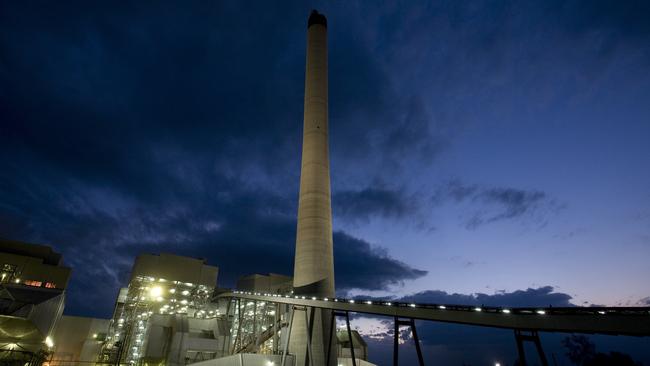Fresh Callide investigation ‘extraordinary’, Queensland opposition say
Queensland’s state opposition has called the Federal Court’s decision to back a fresh investigation into Callide C power station failures ‘extraordinary’ as they criticise Labor’s handling of the affair.
The Queensland Energy Minister Mick de Brenni has conceded he still has no idea what caused a catastrophic explosion at one of Queensland’s largest state-owned power stations almost three years on from the incident that triggered mass blackouts.
A Federal Court judge on Monday ordered a fresh investigation into the May 2021 explosion at Callide C power station, which stripped 10 per cent of Queensland’s generating capacity out of the east coast grid and helped push power prices to crisis point on several occasions. A cooling tower at the power station collapsed in a separate incident in October 2022.
Callide, which is operated and half-owned by the Queensland government’s CS Energy, has repeatedly failed to meet scheduled returns and is not due to be fully operational until July 31.
Forensic engineer Sean Brady was commissioned by CS Energy in June 2021 to investigate the causes of the failures, but the status of his report remains unclear.
In an extraordinary admission on Tuesday, Mr de Brenni said he was unaware of when the report would be released and would not say whether he had personally sought explanations about why it had been delayed.
“Well, I don’t have it, I’d like to see it and it’s taken a very long time, which means I, like Queenslanders, are frustrated,” he said.
“I’m not a forensic engineer, you would need to ask Dr Brady about his timeframes, and I’m not going to interfere with his timeframes.”
Mr de Brenni, who is the shareholding minister in CS Energy, said he had not seen any draft recommendations or findings from Dr Brady and did not know what caused the explosion.
He said CS Energy had advised him that the report was due to be finished “soon”.
The full contents of the investigation’s findings may not be made public due to commercial reasons, but Mr de Brenni said CS Energy intended to release “technical lessons from this incident so it doesn’t happen again.”
“I want to know what happened at Callide too,” he said.
“We won’t know until the experts have finished their investigations. I’m not a forensic engineer, my job is to manage the energy system in the best interests of Queenslanders”
Mr de Brenni denied problems at Callide, which is the state’s fifth largest coal power station, had driven up power bills.
“The price path for wholesale power in Queensland has tracked very closely to wholesale power prices in other states,” he said.
Queensland Liberal National Party leader David Crisafulli described the Federal Court’s decision to authorise a new investigation into failings at Callide as “explosive”.
“This is a power plant that has a huge impact on the price of electricity that Queenslanders pay,” he said.
“It has been offline for nearly 1000 days, there is a secret report that Queenslanders have never seen and now a Federal Court has removed the excuses when it comes to the government hiding what went on.
“It is an asset that is owned by Queenslanders, they deserve to know what went on there, they deserve to know why it has not been brought back online, they deserve to know the impact on their electricity bills.”
Justice Roger Derrington’s judgement on Monday backed Czech coal tycoon Pavel Tykac’s bid to appoint FTI Consulting’s John Park and Benjamin Campbell as special purpose administrators could ramp up political pressure on new Labor premier Steven Miles over the incidents.
The extensive powers given to special administrators FTI means that senior executives of state owned CS Energy — and potentially even politically-connected board members such as former chairman Jim Soorley — could be hauled into court to face public examination over what they know about the catastrophe.
Justice Derrington was scathing of appointed administrators Deloitte’s failure to uncover why the C4 turbine at Callide C exploded in May 2021, or why part of the cooling tower collapsed in October 2022.

Mr Tykac’s Sev.en Global Investments, one of the private investors in Callide C, welcomed the court’s ruling.
“The comprehensive and impartial examination of the circumstances and causes leading to Callide’s C unit 4 turbine explosion in 2021 and unit 3 cooling tower structural collapse in 2022 will help achieve transparency,” Sev.en chief executive Alan Svoboda said.
“And (it will) assist in the recovery of Callide C as well as upholding industry standards across the rest of the state’s critical energy infrastructure.
“We will finally be delivered answers, whether it was possible to prevent the failures.”
A CS Energy spokeswoman said Dr Brady has not yet completed the review into the Callide C4 explosion, but he “confirmed” it is in the final stages of drafting.
“Based on our findings and investigations, we anticipate we will be able to share our understanding of the technical root causes of the C4 event in the coming weeks,” she said.







To join the conversation, please log in. Don't have an account? Register
Join the conversation, you are commenting as Logout